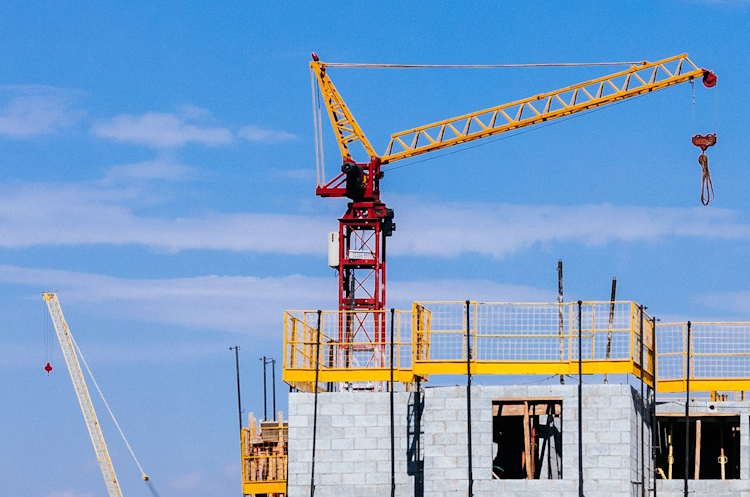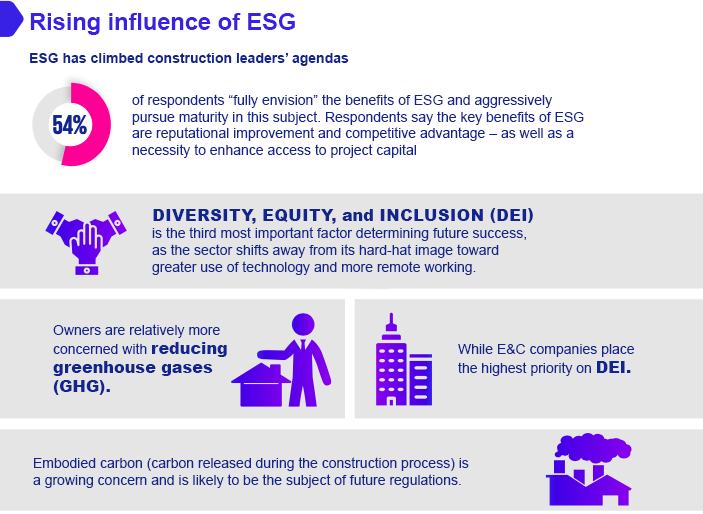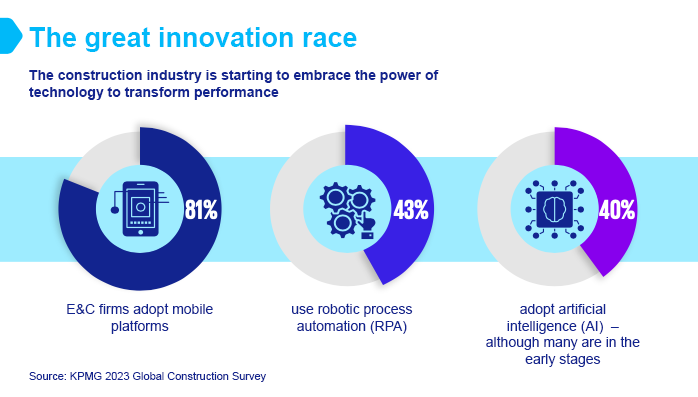66% of company executives in the global construction industry are optimistic about the development of the construction market
The results of the KPMG 2023 Global Construction Survey have been released

The combination of large-scale government infrastructure initiatives, a revolution in renewable energy, increased capital investments in strategically important sectors, and projects in the post-COVID-19 period create excellent prospects in the global construction industry.
The results of the KPMG 2023 Global Construction Survey in the construction industry worldwide in 2023 show that the prevailing sentiment is cautiously optimistic. Two-thirds (66%) of respondents are optimistic about the development of the construction market, with 78% believing that infrastructure initiatives will have a positive impact.
However, the global construction industry continues to face an unstable environment, with ongoing supply chain disruptions, rising inflation in energy prices, materials, and wages, labour shortages, and potential recessions that can significantly impact certain sectors. Persistent challenges related to project inefficiencies, low productivity, failures of major projects, as well as high-profile bankruptcies, continue to haunt the industry.
Andriy Tymoshenko, Director, Head of Strategy and Operations Management Consulting practice at KPMG Ukraine, comments: "Ukraine's government, together with international partners, despite active hostilities, is already planning post-war recovery based on new sustainable ESG standards and the principle of building back better. It is expected that 2023 will be a year of economic recovery, with prospects for new opportunities in key industries being considered. The role of the construction industry in the processes of restoring industrial facilities, housing, transportation, and social infrastructure cannot be overestimated. Considering the scale of destruction caused by the full-scale war in Ukraine and the requirements for recovery, Ukraine is referred to as one of the largest construction sites in the world. The construction industry itself can become one of the key drivers of Ukraine's revival after the end of hostilities and the attainment of victory."
Addressing productivity challenges in the industry
Efficiency in project execution remains a focal point: only half of construction project owners claim that construction is completed on time and 87% state that projects are under heightened control.
To overcome current challenges in an unstable environment, construction industry executives prioritise effective organisational management, efficient risk management and sustainable development planning, technology implementation, risk redistribution, and increased innovation.
Rising influence of Environmental, Social, and Governance (ESG) standards
The results of a similar study in 2008 showed that positioning oneself as an innovative or environmentally conscious organisation and increasing business opportunities and competitiveness were the driving forces of sustainability in the global construction industry.
Over the course of 15 years, the situation and perspectives of construction industry leaders worldwide have changed – ESG issues now hold a prominent place on the industry leaders' agenda. 54% of respondents fully understand the benefits of ESG and are actively striving for their organisations to achieve maturity in this regard. Respondents assert that the key advantages of ESG include reputation enhancement, competitive advantages, and the necessity to expand access to project capital.

Diversity, equity, and inclusion (DEI) emerge as the third most crucial factor determining the industry's future success, as the sector moves away from its image solely focused on construction toward broader utilisation of technology and remote work opportunities.
Project owners express greater concern towards greenhouse gas (GHG) emissions reduction, while engineering and construction companies prioritise DEI issues. Carbon emissions resulting from construction processes are increasingly causing concern and may become subject to future regulations.
The workforce issue remains acute for the construction industry. Over the past decades, the global construction sector has made impressive strides in workers' safety. The results of this survey indicate that companies continue to prioritise workers' safety. Respondents seek to enhance safety monitoring and health and well-being testing for workers to mitigate the risk of accidents.
The great race of innovation
The technological dilemma remains relevant as construction owners and executives worldwide contemplate where to invest and how to secure funds to become digital leaders in the industry. Some breakthrough innovative approaches, such as modular construction, are still relatively low-tech and not widely adopted, but they are gaining traction globally.

The construction industry is beginning to leverage technology to increase productivity. 81% of engineering and construction companies are implementing mobile platforms, 43% are using robotic process automation (RPA), and 40% are applying artificial intelligence (AI), although many are still in the early stages.
When it comes to maximising return on investment in landmark projects, project management information systems (PMIS), building information models (BIM), and advanced data analytics hold the most potential. Digital twins, modular construction, and artificial intelligence contribute to the greatest project efficiency improvements.
Most respondents consider prefabrication (modular construction) as a crucial solution for landmark projects, although only a quarter of engineering and construction companies utilise modular construction in all projects. Recognition of technology's potential for improving safety, particularly through modular construction, is increasing, reducing the amount of hazardous work on construction sites.
Companies that can collect and analyse data, and draw practical insights from it, are expected to reduce costs, increase project profitability, and ensure greater efficiency and workplace safety. They may also be able to attract a new generation of workers who are adept at working with technology and see opportunities for creating smart and sustainable buildings and infrastructure for the future.
About the 2023 Global Construction Survey
It is the 14th global survey conducted by KPMG, built upon the insights of nearly 300 participants – representatives from large-scale construction projects and engineering and construction companies worldwide.
KPMG Profile:
KPMG is an international network of independent firms providing audit, tax, and advisory services. We work closely with our clients, helping them address risks and seize opportunities for their businesses. With offices in 143 countries worldwide, KPMG employs over 265,000 professionals.
If you have read this article to the end, we hope that means it was useful for you.
We work to ensure that our journalistic and analytical work is of high quality, and we strive to perform it as competently as possible. This also requires financial independence. Support us for only UAH 196 per month.
Become a Mind subscriber for just USD 5 per month and support the development of independent business journalism!
You can unsubscribe at any time in your LIQPAY account or by sending us an email: [email protected]




